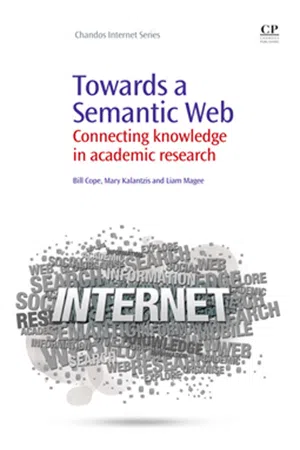
Towards A Semantic Web
Connecting Knowledge in Academic Research
- 544 pages
- English
- ePUB (mobile friendly)
- Available on iOS & Android
About this book
This book addresses the question of how knowledge is currently documented, and may soon be documented in the context of what it calls 'semantic publishing'. This takes two forms: a more narrowly and technically defined 'semantic web'; as well as a broader notion of semantic publishing. This book examines the ways in which knowledge is represented in journal articles and books. By contrast, it goes on to explore the potential impacts of semantic publishing on academic research and authorship. It sets this in the context of changing knowledge ecologies: the way research is done; the way knowledge is represented and; the modes of knowledge access used by researchers, students and the general public.- Provides an introduction to the 'semantic web' and semantic publishing for readers outside the field of computer science- Discusses the relevance of the 'semantic web' and semantic publishing more broadly, and its application to academic research- Examines the changing ecologies of knowledge production
Frequently asked questions
- Essential is ideal for learners and professionals who enjoy exploring a wide range of subjects. Access the Essential Library with 800,000+ trusted titles and best-sellers across business, personal growth, and the humanities. Includes unlimited reading time and Standard Read Aloud voice.
- Complete: Perfect for advanced learners and researchers needing full, unrestricted access. Unlock 1.4M+ books across hundreds of subjects, including academic and specialized titles. The Complete Plan also includes advanced features like Premium Read Aloud and Research Assistant.
Please note we cannot support devices running on iOS 13 and Android 7 or earlier. Learn more about using the app.
Information
Table of contents
- Cover image
- Title page
- Table of Contents
- Copyright
- List of figures and tables Figures
- Authors
- Chapter 1: Changing knowledge systems in the era of the social web
- Chapter 2: Frameworks for knowledge representation
- Chapter 3: The meaning of meaning: alternative disciplinary perspectives
- Chapter 4: What does the digital do to knowledge making?
- Chapter 5: Books and journal articles: the textual practices of academic knowledge
- Chapter 6: Textual representations and knowledge support-systems in research intensive networks
- Chapter 7: An historical introduction to formal knowledge systems
- Chapter 8: Contemporary dilemmas: tables versus webs
- Chapter 9: Upper-level ontologies
- Chapter 10: Describing knowledge domains: a case study of biological ontologies
- Chapter 11: On commensurability
- Chapter 12: A framework for commensurability
- Chapter 13: Creating an interlanguage of the social web
- Chapter 14: Interoperability and the exchange of humanly usable digital content
- Chapter 15: Framing a new agenda for semantic publishing
- Index